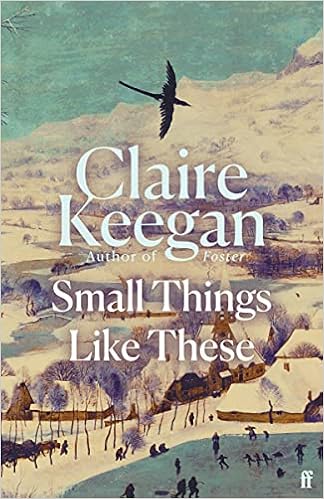4.5 Stars
This novella, which says a great deal in a few words, will not leave you unaffected.
Bill Furlong is a 39-year-old fuel merchant in New Ross, County Wexford, Ireland. He is also a family man with a wife and five daughters. Making Christmas deliveries, he finds a young woman locked in the coal shed of the Catholic convent. The nuns operate St. Margaret’s “the only good school for girls in the town” but also a training school where “girls of low character . . . spent their days being reformed, doing penance by washing stains out of the dirty linen, that they worked from dawn til night.”
Seeing what he does, Bill faces an internal conflict: “he felt his self-preservation and courage battling against each other.” He needs to provide for his family and his wife Eileen warns him about the importance of staying “’on the right side of people’” and that may mean turning a blind eye: “’If you want to get on in life, there’s things you have to ignore, so you can keep on.’” Rumours spread quickly and Bill notices that a store clerk “the well-dressed woman behind the counter, the wife of one of his good customers, didn’t seem overly eager to serve him.” Bill knows full well that “It would be the easiest thing in the world to lose everything.”
On the other hand, Bill remembers that his mother could have faced a similar fate to the girls in the training school/commercial laundry. She was only sixteen when she was pregnant with Bill but fortunately had the help of her employer who also became a protector for Bill. He can also not but ask, “’But what if it was one of ours?’” And he can’t help but ask, “was there any point in being alive without helping another? Was it possible to carry on along through all the years, the decades, through an entire life, without once being brave enough to go against what was there and yet call yourself a Christian, and face yourself in the mirror?”
The power of the nuns is emphasized. The convent “was a powerful-looking place on the hill at the far side of the river with black, wide-open gates and a host of tall, shining windows, facing the town.” A businesswoman also advises Bill: “’surely you must know these nuns have a finger in every pie.’” The Mother Superior warns Bill that his interference could have consequences; knowing that Bill wants his daughters to attend St. Margaret’s, she says, “’It’s no easy task to find a place for everyone.’”
The wealth of the convent is also mentioned: it is, for example, heated with “Furlong’s best coal.” Financial gain seems to be a priority; at a social function, “the nuns walked around, supervising and talking to some of the more well-off parents.” Mother Superior can give Bill a fifty-pound note, really as a bribe, and the nuns “always pay what was owing and on time unlike so many who would put everything on the slate.” The nuns are able to spend money on their garden (“Year round, the front garden was kept in order with shaved lawns, ornamental shrubs growing neatly in rows, the tall hedges cut square”) but meanwhile “The dole queues were getting longer.” Bill, on the other hand, is so generous that Eileen comments on his being “soft-hearted.” “More than a few times, Furlong stopped to leave a bag of logs at the doors of those who had given him the business, when they could afford it.” Christian charity seems not to be found amongst the Good Shepherd nuns.
The cruelty of the nuns is in no doubt, but the Catholic Church at large is not blameless: Bill thinks about speaking to the parish priest about his suspicions about the convent but concludes “the priests already knew.” The community is also responsible for enabling the nuns: Bill mentions that “’they’ve only as much power as we give them.’” And by disregarding what is going on, they perpetuate the suffering of the young women. Eileen is typical of those who are fearful and selfish: she is concerned about her daughters but argues “’what do such things [as are going on at the convent] have to do with us?’”
At the end of the novel, there’s a note about the number of girls and women who “suffered time in Ireland’s mother and baby homes and Magdalen laundries.” It is horrifying to read that “Most of the records from the Magdalen laundries were destroyed, lost, or made inaccessible. . . Many girls and women lost their babies. Some lost their lives. Some or most lost the lives they could have had. It is not known how many thousands of infants died . . . These institutions were run and financed by the Catholic Church in concert with the Irish State.” As a Canadian, I couldn’t but notice the parallels with Canada’s residential schools and the recent discovery of unmarked graves at those institutions.
This book wastes no words. Every word seems to have been carefully chosen. For instance, lengthy academic essays could be written about the author’s use of imagery (crows, blackness) and allusions to Nativity scenes and the novels of Charles Dickens. But even without detailed analysis, the novella’s emotional impact is undeniable.
And why not listen to “The Magdalene Laundries” by Joni Mitchell for another artistic retelling of the horrific story of these institutions?

No comments:
Post a Comment